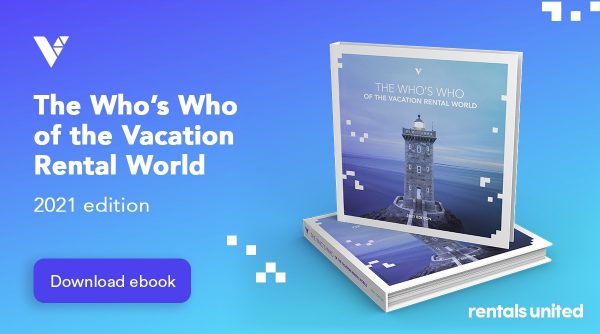The goal of vacation rental copywriting is to get more bookings for your business. But how does copy do that, exactly?
In our view, these are the three main goals of your copy, particularly your property descriptions:
- Build trust. As we will dig into later, your copywriting is your voice. It’s the way you get guests to see that you are real people who care about the guests’ good time, which is crucial in digital transactions.
- Build interest. Photos do a lot to show potential guests what to expect at a property, but words describe what photos can’t show (i.e. whether the pool is heated, what it’s like to have an al fresco meal in the Tuscan breeze, etc.)
- Create clarity. A great description will anticipate (and answer) potential guests’ questions quickly, which saves you time on pre-booking communication and prompts guests to pull the trigger on their trip.
But how do you achieve these goals and turn your copy into a powerful vacation rental marketing tool? Let’s take a look.

The Rentals United channel manager lets you easily distribute your listings – including property descriptions – across 60+ channels from one place. Book a demo now to find out more.
1. How can I scale my vacation rental copywriting for 50, 100, or 500+ properties?
As your property management or short-term rental company grows, juggling the property description writing process can become more challenging. While vacation rental owners may only be focused on a single listing, you may be aiming to earn bookings across hundreds of properties at the same time. The key to scaling your property descriptions for a large volume of rentals is to create a flexible template that outlines how each description should be structured.
Among other benefits, templates can:
- Slot easily into your workflow.
- Help guests to browse and compare properties.
- Add to a sense of professionalism.
- Ensure that no matter who writes the property listing, it will be an effective addition to your marketing.
Many of our core clients (vacation rental businesses) come to us with a sense that their rental listing descriptions are not as good as they could be. But they don’t have time to really figure out what would make them better, let alone actually go in and make those changes.
A template alleviates that “we could do better” feeling for future listings, as well as makes it easier to go back and restructure older listings to fit your new format.
2. What makes for a good property description template?
A general rule of vacation rental copywriting (and copywriting, in general) goes like this:
The goal of your property headline/title is to get the initial click and read the first line. From there, the goal of the first line of your property description is to get them to read the second one. The goal of the second sentence is to move them along to the third. That first impression (the headline, thumbnail photo + first sentence) is key.
For this reason, be careful not to “bury the lede” — a journalism term for taking too long to get to the meat of the story. Instead, identify your top three selling points and include them in the first line or two of the listing. (In some cases, those first one or two lines are all your guests will need to be convinced.)
After that, it’s all about answering FAQs that your guests might have. How far from x attraction? How many people can the dining table seat? As a property manager, you may find that these questions/answers are often the same across your rentals. If you have properties near the beach, for example, guests will inevitably wonder exactly how far you are from it. So bake the answer to that question into your template.
Hint: Your photo captions are also a great place to answer FAQs.
From there, talk about the property’s location and a bit about your property management company’s mission and what their experience staying at one of your properties will be like. The good news is, you can often re-use the information in items #3 and #4 (especially #4). Plug these into the template and half the headache is gone!
In short, a rough outline for a template might look like:
- Headline (more on that in a minute)
- Unique selling points (focus on three)
- FAQs (may differ by property)
- Location info
- Property manager info
Some listing sites, like Airbnb, have specific sections for various aspects of the property description, like “Getting Around” and “Interaction with Guests.” In that case, you may want to tailor your listing for Airbnb and then adapt as needed for Vrbo (formerly HomeAway) and other listing sites as well as your own website. The vacation rental industry is always changing, and Rentals United helps your listings get out to all of the relevant booking sites easily.
Or, if you are aiming to get more direct bookings, you may want to make your website copy structure priority #1 and then adapt for the listing sites.

3. How do I write a persuasive headline?
Headlines are your handshake with the potential guest. You can template these, too, which makes it easy to edit all your headlines for consistency and make sure all new properties follow the same format.
All headlines should be focused around your top one, maybe two, unique selling points. If you live in a recognizable area, name it.
Here are a couple of tested examples that work well:
- (Name of Property): A (Adjective) (House/Condo/Retreat/Estate) for (Type of Guest or Unique Selling Point)
- Example: The Orchid: A Designer Condo for Couples in the Canal District
Hint: Including the property’s name in your headline helps your guests to find you later… or, if they’re intrepid, find their way from the listing site to your website to book direct.
- (Unique Selling Points) in (Destination)
- Example: Ocean-View Hot Tub and Boardwalk Access on Venice Beach
4. What specific words help land bookings?
Truthfully, there are no magic-bullet words that are guaranteed to get bookings. (If only!) Really, it all depends on the context.
But we do have some general advice. First, focus on positive words rather than negative ones to describe your rental properties. For example, “Our high-quality Serta mattresses ensure a blissful night of sleep” works much better than “Our high-quality Sera mattresses ensure you won’t toss and turn all night.”
The latter puts the image of tossing and turning in guests minds, which is no good. You want them to feel relaxed and comfortable—exactly how they want to feel on vacation.
We also recommend using your words to set the scene for guests. “Enter our home and enjoy a great view” isn’t the best way to introduce a breezy beachfront property. “Shake off the sand, step inside, and watch the tide roll in from picture windows” is much better.

5. Should I think about Google and SEO as I write property descriptions?
Yes and no. Not in terms of top of funnel keywords for your primary destination, i.e. “Paris holiday apartments” or “Orlando vacation rentals.” These are unlikely to have an impact, and your property detail pages and property descriptions won’t rank for that type of query. Typically the homepage of your vacation rental website is the ranking page for these top of funnel searches.
However, we do recommend that each property have its own brand — i.e. “The Blue Lagoon Bungalow” or “The Urban Chalet.” These names, if unique enough, can provide SEO value and help guests to relocate your properties easily in a Google search.
Think, for example, of a scenario in which a guest is browsing properties, finds one of yours, and then navigates away, or has to go make dinner. With a memorable brand, they can type in the property name and find it again. Or find it next year when they want to come back.
Guest also tend to shop around for the best deals. So, if you have a recognisable property name on the OTAs, guests may type it into Google to see if they can find your website and save money by booking directly with you.
6. Do I need to have a “brand voice” in my vacation rental copywriting?
In short: yes. As we said earlier, your voice is what allows guests to feel a connection with you and your company. Infusing your vacation rental copywriting with some personality reminds guests of the human element that’s easy to forget in an entirely digital transaction.
To develop your brand voice, consider the type of property/experience you offer and how you want to come across to guests. High-end, luxury property managers may want to focus on a more refined voice—like what you’d use with professional contacts. Managers with a laidback rental portfolio use a more casual tone—like an email to a friend.
7. Should I hire a copywriter?
If you’re feeling overwhelmed by website copy, SEO, content marketing, blogging, social media, and all the other online content required when you run a property management company… you might consider hiring a dedicated copywriter to help. Depending on your volume, you can hire someone for full-time, part-time, or contract (freelance) hours as needed.
Or you can hire Guest Hook. We have a team of trained vacation rental copywriters with vacation rental copywriting experience and can be hired by-the-project as well as long-term contracts to handle all the written aspects of your digital presence.
Need an easy way to distribute all your listings – including property descriptions and photos – to 60+ channels? Book a free 30-minute demo and get acquainted with the Rentals United channel manager.
Editor’s note: This post was originally published in June 2017 and has been updated.